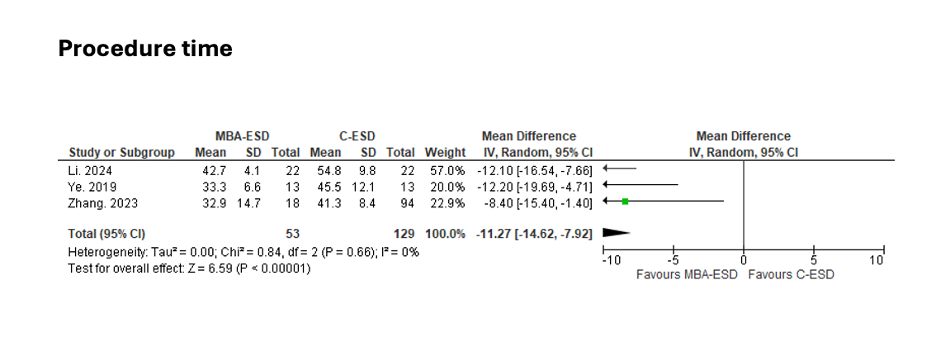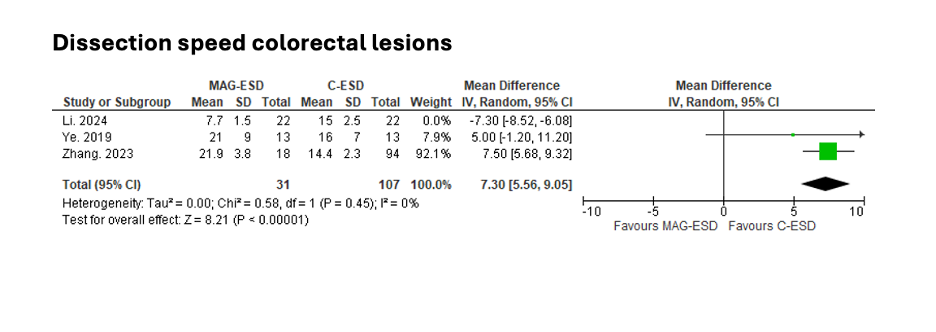Tuesday Poster Session
Category: Interventional Endoscopy
P5698 - Safety and Efficacy of Magnetic Anchor-Guided Endoscopic Submucosal Dissection for Gastrointestinal Lesions and Comparison With Conventional ESD: A Systematic Review and Meta-Analysis
Tuesday, October 28, 2025
10:30 AM - 4:00 PM PDT
Location: Exhibit Hall

Hafsah Ijaz, MD (she/her/hers)
Capital Health New Jersey
Trenton, NJ
Presenting Author(s)
Hafsah Ijaz, MD1, Aamir Saeed, MD2, Rahul Kumar, MD3, Ali Jaan, MD4, Saira Yousuf, MD2, Aeman Nisar, MD5, Nilay Bhatt, MD6, Muhammad Haseeb, MD7, Ijlal Akbar. Ali, MD8, Faisal Kamal, MD9, Sultan Mahmood, MD7
1Capital Health New Jersey, Trenton, NJ; 2Vanderbilt University Medical Center, Nashville, TN; 3North Central Bronx Hospital, Bronx, NY; 4Unity Hospital, Rochester, NY; 5Services Institute of Medical Sciences, Lahore, Punjab, Pakistan; 6HCA Houston Clear Lake, Houston, TX; 7University of Pittsburgh Medical Center, Pittsburgh, PA; 8University of Oklahoma, Oklahoma City, OK; 9Sidney Kimmel Medical College at Thomas Jefferson University, Philadelphia, PA
Introduction: Conventional endoscopic submucosal dissection (C-ESD) has been widely used for treatment for early gastric cancer and large colorectal lesions. However, poor visualization of the operative field increases both the procedure time and the risk of complications, especially for large and difficult lesions. The feasibility of magnetic anchor-guided endoscopic submucosal dissection (MAG-ESD) has not been evaluated yet. We conducted a meta-analysis to evaluate comparative outcomes of MAG-ESD and C-ESD in GI lesions, especially large colorectal lesions.
Methods: Several databases were reviewed from inception to April 11, 2025, to identify studies comparing the outcomes of MAG-ESD and C-ESD in GI lesions. Our outcomes of interest were en bloc resection, R0 resection, perforation, overall bleeding, procedure time and dissection speed. We calculated risk ratios (RRs) with 95% CI for categorical variables and mean differences with 95% CI for continuous variables. Data was analyzed using the random effect model. Heterogeneity was assessed using I 2 statistics.
Results: We included 7 studies (3 comparative and 4 single arm) with 480 patients (MAG-ESD 196, C-ESD 480) in our analysis. Four studies reported the data on large colorectal lesions and 3 studies reported on gastric lesions. The mean age of the patients was 64.4(4.7) years.
Comparative analysis of MAG-ESD and C-ESD showed that MAG-ESD was associated with shorter procedure time (minutes) , MD(95% CI): -11.7 (-14.62, -7.92)) p< 0.00001, I2 0% and higher dissection speed (mm2/min), MD (95% CI): 7.30 (5.56, 9.05) p< 0.00001, I2 0% as compared to C-ESD. There was no significant difference of en bloc resection (p=0.55), R0 resection (p=0.42), and bleeding rates (p=0.53) between the groups.
Pooled rates (95% CI) of en bloc resection of MAG-ESD were 98.1%(94.7%, 99.3%), p=0.99, I2 0%, complete resection, 98.1%(94.2%, 99.4%), p=0.97, I2 0%, and overall bleeding, 2.8 %(1.1%, 6.9%), p=0.9, I2 0%. One case of perforation was reported in C-ESD.
Discussion: Our meta-analysis demonstrates that MAG-ESD was associated with shorter procedure time and higher dissection speed as compared to conventional ESD. MAG-ESD can be used for larger sizes and lesions in difficult locations. Future multicenter studies are needed to validate these findings further.

Figure: Comparison of Procedure Time between MAG-ESD and Conventional ESD

Figure: Comparison of Dissection Speed between MAG-ESD and Conventional ESD
Disclosures:
Hafsah Ijaz indicated no relevant financial relationships.
Aamir Saeed indicated no relevant financial relationships.
Rahul Kumar indicated no relevant financial relationships.
Ali Jaan indicated no relevant financial relationships.
Saira Yousuf indicated no relevant financial relationships.
Aeman Nisar indicated no relevant financial relationships.
Nilay Bhatt indicated no relevant financial relationships.
Muhammad Haseeb indicated no relevant financial relationships.
Ijlal Ali indicated no relevant financial relationships.
Faisal Kamal indicated no relevant financial relationships.
Sultan Mahmood indicated no relevant financial relationships.
Hafsah Ijaz, MD1, Aamir Saeed, MD2, Rahul Kumar, MD3, Ali Jaan, MD4, Saira Yousuf, MD2, Aeman Nisar, MD5, Nilay Bhatt, MD6, Muhammad Haseeb, MD7, Ijlal Akbar. Ali, MD8, Faisal Kamal, MD9, Sultan Mahmood, MD7. P5698 - Safety and Efficacy of Magnetic Anchor-Guided Endoscopic Submucosal Dissection for Gastrointestinal Lesions and Comparison With Conventional ESD: A Systematic Review and Meta-Analysis, ACG 2025 Annual Scientific Meeting Abstracts. Phoenix, AZ: American College of Gastroenterology.
1Capital Health New Jersey, Trenton, NJ; 2Vanderbilt University Medical Center, Nashville, TN; 3North Central Bronx Hospital, Bronx, NY; 4Unity Hospital, Rochester, NY; 5Services Institute of Medical Sciences, Lahore, Punjab, Pakistan; 6HCA Houston Clear Lake, Houston, TX; 7University of Pittsburgh Medical Center, Pittsburgh, PA; 8University of Oklahoma, Oklahoma City, OK; 9Sidney Kimmel Medical College at Thomas Jefferson University, Philadelphia, PA
Introduction: Conventional endoscopic submucosal dissection (C-ESD) has been widely used for treatment for early gastric cancer and large colorectal lesions. However, poor visualization of the operative field increases both the procedure time and the risk of complications, especially for large and difficult lesions. The feasibility of magnetic anchor-guided endoscopic submucosal dissection (MAG-ESD) has not been evaluated yet. We conducted a meta-analysis to evaluate comparative outcomes of MAG-ESD and C-ESD in GI lesions, especially large colorectal lesions.
Methods: Several databases were reviewed from inception to April 11, 2025, to identify studies comparing the outcomes of MAG-ESD and C-ESD in GI lesions. Our outcomes of interest were en bloc resection, R0 resection, perforation, overall bleeding, procedure time and dissection speed. We calculated risk ratios (RRs) with 95% CI for categorical variables and mean differences with 95% CI for continuous variables. Data was analyzed using the random effect model. Heterogeneity was assessed using I 2 statistics.
Results: We included 7 studies (3 comparative and 4 single arm) with 480 patients (MAG-ESD 196, C-ESD 480) in our analysis. Four studies reported the data on large colorectal lesions and 3 studies reported on gastric lesions. The mean age of the patients was 64.4(4.7) years.
Comparative analysis of MAG-ESD and C-ESD showed that MAG-ESD was associated with shorter procedure time (minutes) , MD(95% CI): -11.7 (-14.62, -7.92)) p< 0.00001, I2 0% and higher dissection speed (mm2/min), MD (95% CI): 7.30 (5.56, 9.05) p< 0.00001, I2 0% as compared to C-ESD. There was no significant difference of en bloc resection (p=0.55), R0 resection (p=0.42), and bleeding rates (p=0.53) between the groups.
Pooled rates (95% CI) of en bloc resection of MAG-ESD were 98.1%(94.7%, 99.3%), p=0.99, I2 0%, complete resection, 98.1%(94.2%, 99.4%), p=0.97, I2 0%, and overall bleeding, 2.8 %(1.1%, 6.9%), p=0.9, I2 0%. One case of perforation was reported in C-ESD.
Discussion: Our meta-analysis demonstrates that MAG-ESD was associated with shorter procedure time and higher dissection speed as compared to conventional ESD. MAG-ESD can be used for larger sizes and lesions in difficult locations. Future multicenter studies are needed to validate these findings further.

Figure: Comparison of Procedure Time between MAG-ESD and Conventional ESD

Figure: Comparison of Dissection Speed between MAG-ESD and Conventional ESD
Disclosures:
Hafsah Ijaz indicated no relevant financial relationships.
Aamir Saeed indicated no relevant financial relationships.
Rahul Kumar indicated no relevant financial relationships.
Ali Jaan indicated no relevant financial relationships.
Saira Yousuf indicated no relevant financial relationships.
Aeman Nisar indicated no relevant financial relationships.
Nilay Bhatt indicated no relevant financial relationships.
Muhammad Haseeb indicated no relevant financial relationships.
Ijlal Ali indicated no relevant financial relationships.
Faisal Kamal indicated no relevant financial relationships.
Sultan Mahmood indicated no relevant financial relationships.
Hafsah Ijaz, MD1, Aamir Saeed, MD2, Rahul Kumar, MD3, Ali Jaan, MD4, Saira Yousuf, MD2, Aeman Nisar, MD5, Nilay Bhatt, MD6, Muhammad Haseeb, MD7, Ijlal Akbar. Ali, MD8, Faisal Kamal, MD9, Sultan Mahmood, MD7. P5698 - Safety and Efficacy of Magnetic Anchor-Guided Endoscopic Submucosal Dissection for Gastrointestinal Lesions and Comparison With Conventional ESD: A Systematic Review and Meta-Analysis, ACG 2025 Annual Scientific Meeting Abstracts. Phoenix, AZ: American College of Gastroenterology.
